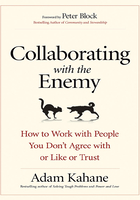
“I COULD NEVER WORK WITH THOSE PEOPLE!”
In November 2015, I was facilitating the first workshop of a group of 33 national leaders. They had come together to search for solutions to their country’s most critical problem: the devastating nexus of insecurity, illegality, and inequality. Everyone at the meeting was worried about this situation and determined to do something about it, and they thought that together they might be able to do more than separately. I thought the project was important and was determined to do a good job.
The participants came from every part of the society: politicians, human rights activists, army generals, business owners, religious leaders, trade unionists, intellectuals, journalists. They had deep ideological differences, and many of them were political or professional or personal rivals. Mostly they didn’t agree with or like or trust each other. In the country and in the group, suspicion and defensiveness were sky-high.
To solve their most important problem, these people needed to work together, but they weren’t sure they could.
I thought the workshop was going well. The participants were talking about their very different experiences and perspectives, all together and in small groups, and at meals and on walks and on trips outside the hotel to visit local people and projects. They were cautiously starting to get to know one another and to hope that together they could make a difference.
Then, on the final morning, the project organizing team (eleven locals and my colleagues and me) got into an argument about some things that were not going well: methodological confusions, logistical glitches, communication breakdowns. Some of the organizers thought I was doing a bad job, and the next day they wrote a critical note that they circulated among themselves.
One of the team members forwarded the note to me. I felt off ended and upset that the organizers were challenging my expertise and professionalism behind my back. I was frightened that the accomplishment and income I was expecting from the project were at risk. I thought I needed to defend myself, so I sent off first one, then a second, and then a third email explaining why, in my expert view, what I had done in the workshop had been correct. I knew that I had made some mistakes but was worried that if I admitted these now, I would be opening myself up to greater danger. I was certain that overall I was right and they were wrong: that they were the villains and I was the victimized hero.
As the week went on and I had phone conversations with different organizers, my attitude hardened. I thought the people who were blaming me for the problems we were having were unconscionably betraying our team effort and me. I fought back and blamed them. I became increasingly suspicious, mistrustful, assertive, and rigid. I also wanted to keep myself safe, so I became increasingly cautious and canny. I decided that I didn’t agree with or like or trust these organizers and didn’t want to engage with them on this matter or to work with them anymore. What I really wanted was for them to disappear.